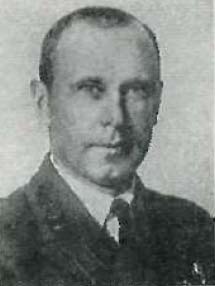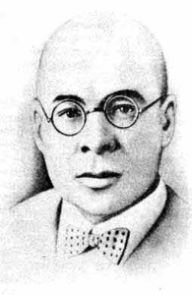 W
WIzrail Iossofovich Agol was a Soviet geneticist and philosopher. He was a member of the USSR Academy of Science, worked briefly in the United States of America and took an interest in radiation induced mutagenesis. As a Marxist philosopher, he also studied vitalist and mechanist views in biology and their relation to Marxism. He was killed in the aftermath of Trofim Lysenko's rise in the Stalin regime.
 W
WYakov Saulovich Agranov was the first chief of Soviet Main Directorate of State Security and a deputy of NKVD chief Genrikh Yagoda. He is known as one of main organizers of Soviet political repressions and Stalinist show trials in 1920s and 1930s. He fabricated the "Tagantsev conspiracy" case and Moscow trials, including Trial of the Twenty One and Industrial Party Trial, as well as mass arrests and executions in Saint Petersburg during Stalin's Great Purge.
 W
WPaluta Badunova was a key female political figure in the Belarusian independence movement of the early 20th century, the only woman at the Council (Rada) of the Belarusian Democratic Republic and a victim of Stalin’s purges of 1937-38.
 W
WAbram Yakovlevich Belenky (Khatskelevich) was a Russian revolutionary, Bolshevik and a major functionary of the Soviet secret police, born in Swierżań, Russian Emipre. In 1919-24 he was a head of V.I. Lenin security later promoted to major of NKVD.
 W
WMichaś Čarot was a Belarusian poet, playwright, novelist, and a victim of Stalin's purges.
 W
WAleś Dudar was a pen name of Aliaksandr Dajlidovič, Belarusian poet, critic, translator and a victim of Stalin's purges.
Boris Mironovich Feldman was a Soviet military commander and politician of Jewish ethnicity.
 W
WEsther Frumkin was a leader of the Yiddish socialist General Jewish Labour Bund in Lithuania, Poland and Russia, and later of the Yevsektsiya in the Soviet Union. An ardent proponent of the Yiddish language, her political position on Jewish assimilation satisfied neither traditional Jews nor the Soviet leaders.
 W
WVilhelm Evgenievich Garf was a Russian and Soviet military leader of German-Latvian descent, Colonel of the General Staff of the Russian Empire. He fought in the First World War, was a member of the Civil War as part of the Red Army, an Officer of the General Staff of the RIA, later - the General Headquarters of the Red Army of the highest service category, division commander and head of the Telecommunications Academy. V.N. Podbelsky. Later he was a victim of political repression in the USSR.
 W
WMarcian Yakovlevich Germanovich was a Soviet division commander and Komkor. He fought in the Imperial Russian Army in World War I before going over to the Bolsheviks in the subsequent Civil War. He was a recipient of the Order of the Red Banner. During the Great Purge, he was arrested on August 7, 1937 and later executed. After the death of Joseph Stalin, he was rehabilitated in 1957.
 W
WBoris Sergeevich Gorbachyov was a Soviet komkor. He was born in present-day Belarus. He fought in the Imperial Russian Army during World War I before going over to the Bolsheviks in the subsequent civil war. He was a recipient of the Order of the Red Banner. During the Great Purge, he was arrested on 3 May 1937 and executed two months later. After the death of Joseph Stalin, he was rehabilitated in 1956.
 W
WPlaton Halavach was a Belarusian writer. During the Great Purge, he became a victim of the 1937 mass execution of Belarusians.
 W
WMaksim Harecki was a Belarusian prose writer, journalist, activist of the Belarusian national-democratic renewal, folklorist, lexicographer, professor. Maksim Harecki was also known by his pen-names Maksim Biełarus, M.B. Biełarus, M.H., A. Mścisłaŭski, Dzied Kuźma, Maciej Myška, Mizeryjus Monus. In his works he often appeared as Kuźma Batura, Liavon Zaduma.
 W
WIzrail Moiseyevich Leplevsky was a Soviet security officer. He was part of the Intelligence Service and Secret police apparatus in the Ukrainian Soviet Socialist Republic, then People's Commissar of Internal Affairs of the Ukrainian SSR from June 14, 1937 to January 25, 1938. His brother Gregory Leplevsky also worked in senior positions in the Soviet Union, including as Prosecutor of the USSR.
 W
WMendel Markovich Khatayevich was a Soviet politician. 17 March 1937 was 2nd Secretary of the Communist Party (Bolsheviks) of Ukraine. He was one of the main organizers of collectivization in the Ukrainian Soviet Socialist Republic, which caused the death by starvation of millions of people.
 W
WMoyshe Kulbak was a Yiddish-language writer.
 W
WVatslaw Yustynavich Lastowski was a Belarusian critic, historian of literature, and politician.
 W
WJurka Listapad was an active participant in the Belarusian independence movement and anti-Soviet resistance, publicist and a victim of Stalin's purges of 1937-38.
 W
WJazep Losik was a Belarusian academic, leading figure of the independence movement and a victim of Stalin's purges.
 W
WJazep Mamońka was а Belarusian politician and victim of Stalin’s purges.
 W
WValery Marakou was a Belarusian poet and translator.
 W
WArkady Pavlovich Rosengolts was a Bolshevik revolutionary, Soviet military leader, politician and diplomat. He was the People's Commissar of Foreign Trade and a defendant at the Moscow Trial of the Twenty-One in 1938.
 W
WVasily Fomich Sharangovich was Belarusian Soviet politician and first secretary of the Communist Party of Byelorussian SSR in the Soviet Union. He was executed after the last of the Moscow Trials, the Trial of the Twenty-One, in 1938.
 W
WArkadź Smolič was an academic, active participant of the Belarusian independence movement and a victim of Stalin's purges.
 W
WNikolai Vladimirovich Sollogub was a Soviet military specialist who served in World War I, the Russian Civil War, and the Polish-Soviet War, reaching the rank of Komdiv in the Red Army. During the Great Purges he was imprisoned and executed.
 W
WBranislaw Adamavich Tarashkyevich was a Belarusian public figure, politician, and linguist.
 W
WUladzimier Teraŭski was a Belarusian composer, choirmaster and a victim of Stalin’s purges. He wrote music to a number of popular Belarusian songs such as Vajacki Marš and Kupalinka.
 W
WAlyaksandr Ivanavich Tsvikyevich was a Belorussian politician, historian, jurist and a philosopher. He served as a Prime Minister of Belarus for two years from 23 August 1923 until October 1925. His interest featured philosophy and history. He worked as a jurist and lawyer. He was also a professor in National Academy of Sciences of Belarus.
 W
WAnatol' Volny was a Belarusian artist, poet, writer and journalist. During the Great Purge, he became a victim of the 1937 mass execution of Belarusians. Posthumously rehabilitated in 1957.
 W
WYakov Arkadyevich Yakovlev was a Soviet politician and statesman who played a central role in the forced collectivisation of agriculture in the 1920s.
 W
WZmicier Khvedarovich Zhylunovich was a Belarusian poet, writer and journalist, known under pen name Tsishka Hartny, and a political leader.